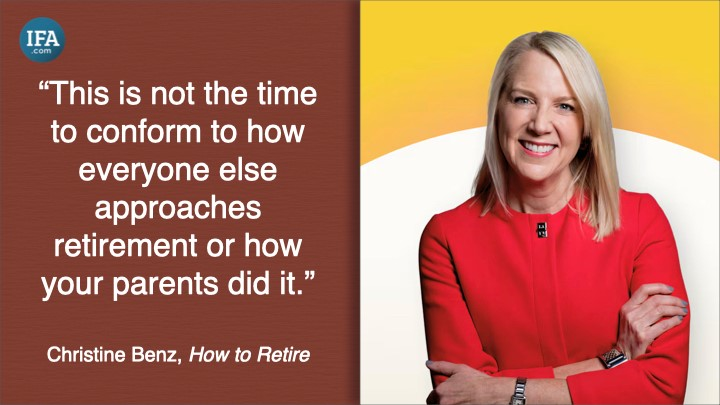As any experienced mountain climber will tell you, it's on the way down a mountain, not the way up, that most accidents happen. It's exactly the same with investing and personal finance.
Most of the focus is on what we call the accumulation phase — in other words, growing your wealth, typically during your working years. But it's when you reach decumulation phase, when you start withdrawing and spending the money you've built up, that you're far more likely to come unstuck without the help of an experienced financial advisor. The consequences if you do can be catastrophic.
For those in the run-up to retirement, I strongly recommend a new book called How to Retire 1 by Christine Benz, director of personal finance and retirement planning for Morningstar. The book is based on a series of interviews with different experts, each with specialist knowledge of a particular area of retirement planning. No, it's certainly no substitute for having you own advisor to help you navigate the retirement maze, but it does provide a thoughtful analysis of some of the key issues you and your advisor need to think about.
This isn't just a book about investing. Retirement is a major life change. The shift from a structured work routine to a more flexible, self-directed lifestyle can have a profound impact on your finances, your daily life, and indeed your sense of identity. If you don't plan it carefully — again, preferably in conjunction with a professional financial planner — you risk becoming frustrated, unhappy or even depressed. Christine Benz's book is full of practical, actionable advice on how to prevent that happening.
Here, then, are five important lessons How to Retire can teach us.
Lesson #1 — Decide What You Really Want To Do
Retirement is a huge opportunity to do what you want to do, and not what other people want or expect you to do. "This is not the time to conform to how everyone else approaches retirement," Benz writes, "or how your parents did it. If you've always wanted to live in a tiny house, complete a triathlon, or write a children's book, these are your years to try your hand at pursuing those goals."
A recurring theme in the book is the value of experimentation. In other words, ""try it before you buy it." So, for example, instead of giving up your job, try asking your employer if you could just do the parts of it you like. Instead of selling your home and moving to your favorite state, rent a place for a month to see if you like it.
However, you shouldn't just focus on "big picture" stuff. "The older I get," the author writes, "the more I'm convinced that success in life isn't about ‘big-P' purpose and bucket lists. It's about what I think of as "micro-joys" — a walk with a friend to get coffee, a perfect meal on the patio on a summer night, getting lost in a wonderful book."

Lesson #2 — Find The Right Asset Allocation
Most people don't (or at least shouldn't) stop investing when they finish work. Retirement can last for decades, and it's important to keep putting your hard-earned money to work.
Your expected investment returns are primarily governed by one thing: your asset allocation, or risk exposure. So getting your asset allocation right is hugely important.
The expert Benz interviewed for this chapter is the author William Bernstein. The right asset allocation for you, Bernstein suggests, depends on your answers to these four questions:
- How much are you planning on spending?
- How old are you?
- What's your risk capacity? And
- Do you care more about maximizing consumption during your lifetime or leaving a request?
Again, there are no easy answers. Risk capacity, in particular, is unique to each individual. Finding out your particular risk capacity, and choosing an asset allocation that matches it as closely as possible can only really be done with the help of an advisor.
Lesson #3 — Choose The Income Strategy That's Right For You
A crucial decision that every retiree and their advisor need to make is what their retirement income strategy is going to be — in other words, how to generate a sustainable income from their savings and investments. The goal is to ensure that you have enough money to cover living expenses throughout your retirement, while managing risks like outliving your savings or facing unexpected costs.
A key takeaway from the book is that there's no such thing as a one-size-fits-all retirement income solution. The author writes: "Finding the right retirement income strategy involves some introspection: your attitude toward taking equity risk or locking in a safe stream of income; your preference for flexibility or a permanent solution; and whether you'd rather spend more early on to elevate your quality of life in the here and now or defer gratification to improve the odds that you won't run out."
Lesson #4 — Focus Only On What's Within Your Control
Another value lesson contained in How to Retire is the importance of recognizing what you can and can't control, and focussing your attention only on the former.
Maria Bruno, a retirement planning specialist at Vanguard, tells Benz that it's easy for retirees to feel overwhelmed if they pay too much attention to things they have no control over. An obvious example is the fluctuating stock market; prices are bound to go up and down over time, but there's no point in worrying when you can't do anything about it. Nor do you know how long you're going to live for.
There are, however, several things you can do to improve your financial wellbeing after leaving full-time work. For example, you can define a clear vision for your retirement — your preferred lifestyle, what you want to do with your time, where you want to live, and so on. You can also find activities to give you a sense of meaning and purpose. You can carefully manage your ongoing costs, including your investment fees. Crucially, you and your advisor can produce a robust financial plan, including cash flow models to ensure that you'll remain financially resilient, whatever the future has in store.
Lesson #5 — Seek Specialist Long-term Tax Advice
If you thought taxes are a minefield now, your tax affairs are likely to become even more complex post-retirement. Making mistakes, such as failing to utilize the available tax allowances, can prove very costly.
As tax specialist Mike Piper explains in his interview with the author, retirement requires a shift in mindset from annual tax filing to long-term tax planning that considers lifetime income needs and potential tax burdens for heirs. "The goal, says Piper, "is not, ‘Let's minimize our taxes this year and do that every year." If you do that, it's going to backfire... It makes much more sense to do a lifetime plan."
It's vital, then, to work with a professional who understands the intricacies of different savings and investment vehicles, withdrawal strategies, and tax regulations on things like lifetime giving and bequests. A financial advice firm like IFA, which has a dedicated tax division, is the ideal solution for retirees seeking to minimize the taxes they pay and maximize the money they're able to spend.
How Can We Help?
If you're nearing retirement, or perhaps just starting to think about your life beyond the world of work, we would love to speak to you and help you to plan the retirement you really want. Send us a message and we'll be back in touch to arrange a meeting.
Footnotes:
1. How to Retire: 20 lessons for a happy, successful, and wealthy retirement by Christine Benz is published by Harriman House.
*Quotes and pictures are utilized for illustrative purposes only and should not be construed as an endorsement, recommendation, or guarantee of any particular financial product, service, or advisor.
Robin Powell is the Creative Director at Index Fund Advisors (IFA). He is also a financial journalist and the editor of The Evidence-Based Investor. This article reflects IFA's investment philosophy and is intended for informational purposes only.
This article is intended for informational purposes only and reflects the perspective of Index Fund Advisors (IFA), with which the author is affiliated. It should not be interpreted as an offer, solicitation, recommendation, or endorsement of any specific security, product, or service. Readers are encouraged to consult with a qualified Investment Advisor for personalized guidance. Please note that there are no guarantees that any investment strategies will be successful, and all investing involves risks, including the potential loss of principal. Quotes and images included are for illustrative purposes only and should not be considered as endorsements, recommendations, or guarantees of any particular financial product, service, or advisor. IFA does not endorse or guarantee the accuracy of third-party content. For additional information about Index Fund Advisors, Inc., please review our brochure at https://www.adviserinfo.sec.gov/ or visit our website at www.ifa.com.














